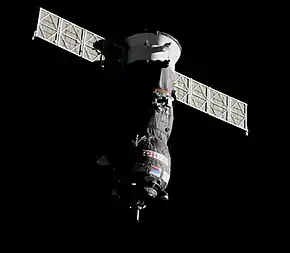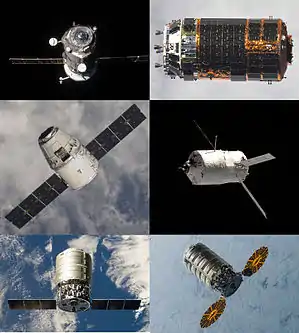Progress MS-16
Progress MS-16 (Russian: Прогресс МC-16), Russian production No. 445, identified by NASA as Progress 77P, is a Progress spacecraft to be launched by Roscosmos to resupply the International Space Station (ISS). This will be the 168th flight of a Progress spacecraft.
 Docking of Progress 76P | |
| Names | Progress 77P |
|---|---|
| Mission type | ISS resupply |
| Operator | Roscosmos |
| Spacecraft properties | |
| Spacecraft | Progress MS-16 |
| Spacecraft type | Progress-MS |
| Manufacturer | Energia |
| Launch mass | 7000 kg |
| Start of mission | |
| Launch date | 15 February 2021 04:45(planned) [1][2][3] |
| Rocket | Soyuz-2.1a |
| Launch site | Baikonur, Site 31 |
| Contractor | Progress Rocket Space Centre |
| End of mission | |
| Disposal | Deorbited (planned) |
| Decay date | June 2021 (planned) |
| Orbital parameters | |
| Reference system | Geocentric orbit |
| Regime | Low Earth orbit |
| Inclination | 51.65° |
| Docking with ISS | |
| Docking port | Poisk Zenith |
| Docking date | February 2021 06:19 (planned) |
| Undocking date | June 2021 (planned) |
Progress ISS Resupply | |
History
The Progress-MS is an uncrewed freighter based on the Progress-M featuring improved avionics. This improved variant first launched on 21 December 2015. It has the following improvements:[4][5][6][7]
- New external compartment that enables it to deploy satellites. Each compartment can hold up to four launch containers. First time installed on Progress MS-03.
- Enhanced redundancy thanks to the addition of a backup system of electrical motors for the docking and sealing mechanism.
- Improved Micrometeoroid (MMOD) protection with additional panels in the cargo compartment.
- Luch Russian relay satellites link capabilities enable telemetry and control even when not in direct view of ground radio stations.
- GNSS autonomous navigation enables real time determination of the status vector and orbital parameters dispensing with the need of ground station orbit determination.
- Real time relative navigation thanks to direct radio data exchange capabilities with the space station.
- New digital radio that enables enhanced TV camera view for the docking operations.
- The Ukrainian Chezara Kvant-V on board radio system and antenna/feeder system has been replaced with a Unified Command Telemetry System (UCTS).
- Replacement of the Kurs A with Kurs NA digital system.
Launch
A Soyuz-2.1a will launch Progress MS-16 to the International Space Station from Baikonur Cosmodrome Site 31 on 15 February 2020 on a fast-track trajectory.[1][2][3] Around 3 hours 20 minutes after the launch, Progress MS-16 will automatically dock to the Russian Orbital Segment of the ISS, where it is expected to remain until June 2021.
Cargo
On February 4, Roskosmos said that Progress MS-16 had been installed back into its processing stand inside the assembly building at Site 254 for final pre-launch operations and loading of fresh food items in its cargo bay.
The ship's cargo included 600 kilograms of propellant for refueling, 420 liters of drinking water in the Rodnik system, 40.5 kilograms of pressurized gases with extra nitrogen supplies and 1,400 kilograms of various equipment and supplies, including the repair kit with reinforced glue patches for temporary sealing of the Transfer Chamber, PrK, in the Zvezda Service Module, SM, Roskosmos said.[8]
The Progress MS-16 spacecraft is loaded with 2,460.5 kg (5,424 lb) of cargo, with 1,400 kg (3,100 lb) of this being dry cargo.
- Dry cargo: 1,400 kg (3,100 lb)
- Propellant: 600 kg (1,300 lb)
- Pressurized Gases: 40.5 kg (89 lb)
- Drinking Water: 420 kg (930 lb)
Undocking and decay
The Progress MS-16 is scheduled to remain docked at the station through June 2021, when it will depart with trash and re-enter the Earth's atmosphere for destruction over the South Pacific Ocean. The Pirs module will also be deorbited along with it to make way for the Nauka module, launching on April 20th, 2021 (unconfirmed).
References
- "Launch Schedule". Spaceflight Now. 31 August 2020. Retrieved 1 December 2020.
- "Progress MS-16". NextSpaceflight. 1 September 2020. Retrieved 1 December 2020.
- "Progress 77P (MS-16)". SpaceLaunchNow. 1 December 2020.
- Krebs, Gunter (1 December 2015). "Progress-MS 01-19". Gunter's Space Page. Retrieved 2 October 2020.
- "Progress MS-16". NASA. 14 May 2020. Retrieved 2 October 2020.
 This article incorporates text from this source, which is in the public domain.
This article incorporates text from this source, which is in the public domain. - Zak, Anatoly (1 December 2015). "Progress-MS". RussianSpaceWeb. Retrieved 2 October 2020.
- Blau, Patrick (1 December 2015). "Progress MS Spacecraft". Spaceflight101. Retrieved 17 November 2020.
- Zak, Anatoly (4 February 2021). "Update: Planned Progress MS-16 Flight". RussianSpaceWeb. Retrieved 5 February 2021.
